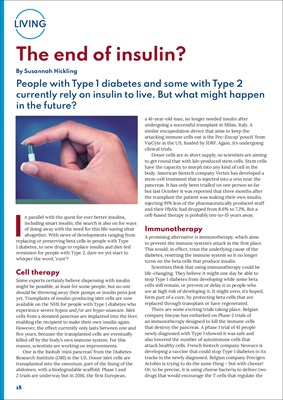
18
LIVING
The end of insulin?
By Susannah Hickling
People with Type 1 diabetes and some with Type 2
currently rely on insulin to live. But what might happen
in the future?
In parallel with the quest for ever better insulins,
including smart insulin, the search is also on for ways
of doing away with the need for this life-saving elixir
altogether. With news of developments ranging from
replacing or preserving beta cells in people with Type
1 diabetes, to new drugs to replace insulin and diet-led
remission for people with Type 2, dare we yet start to
whisper the word, 'cure'?
Cell therapy
Some experts certainly believe dispensing with insulin
might be possible, at least for some people, but no one
should be throwing away their pumps or insulin pens just
yet. Transplants of insulin-producing islet cells are now
available on the NHS for people with Type 1 diabetes who
experience severe hypos and/or are hypo-unaware. Islet
cells from a donated pancreas are implanted into the liver,
enabling the recipient to make their own insulin again.
However, the effect currently only lasts between one and
five years, because the transplanted cells are eventually
killed off by the body's own immune system. For this
reason, scientists are working on improvements.
One is the Biohub 'mini pancreas' from the Diabetes
Research Institute (DRI) in the US. Donor islet cells are
transplanted into the omentum, part of the lining of the
abdomen, with a biodegradable scaffold. Phase 1 and
2 trials are underway but in 2016, the first European,
a 41-year-old man, no longer needed insulin after
undergoing a successful transplant in Milan, Italy. A
similar encapsulation device that aims to keep the
attacking immune cells out is the Pec-Encap 'pouch' from
ViaCyte in the US, funded by JDRF. Again, it's undergoing
clinical trials.
Donor cells are in short supply, so scientists are aiming
to get round that with lab-produced stem cells. Stem cells
have the capacity to morph into any kind of cell in the
body. American biotech company Vertex has developed a
stem-cell treatment that is injected into a vein near the
pancreas. It has only been trialled on one person so far
but last October it was reported that three months after
the transplant the patient was making their own insulin,
injecting 91% less of the pharmaceutically produced stuff
and their HbA1c had dropped from 8.6% to 7.2%. But a
cell-based therapy is probably ten-to-15 years away.
Immunotherapy
A promising alternative is immunotherapy, which aims
to prevent the immune system's attack in the first place.
This would, in effect, treat the underlying cause of the
diabetes, resetting the immune system so it no longer
turns on the beta cells that produce insulin.
Scientists think that using immunotherapy could be
life-changing. They believe it might one day be able to
stop Type 1 diabetes from developing while some beta
cells still remain, or prevent or delay it in people who
are at high risk of developing it. It might even, it's hoped,
form part of a cure, by protecting beta cells that are
replaced through transplant or have regenerated.
There are some exciting trials taking place. Belgian
company Imcyse has embarked on Phase 2 trials of
an immunotherapy designed to kill the immune cells
that destroy the pancreas. A phase 1 trial of 41 people
newly diagnosed with Type 1 showed it was safe and
also lowered the number of autoimmune cells that
attack healthy cells. French biotech company Neovacs is
developing a vaccine that could stop Type 1 diabetes in its
tracks in the newly diagnosed. Belgian company Precigen
Actobio is trying to do the same thing - but with cheese!
Or, to be precise, it is using cheese bacteria to deliver two
drugs that would encourage the T cells that regulate the